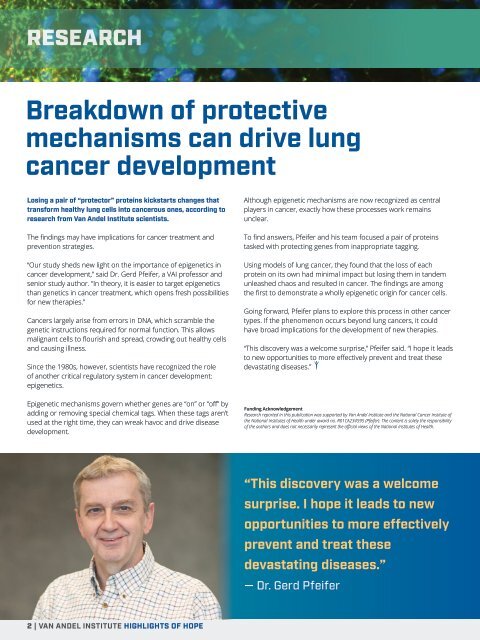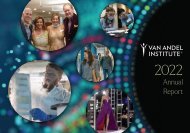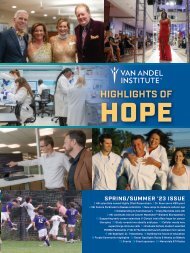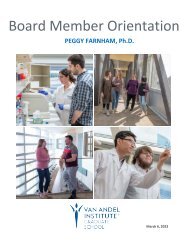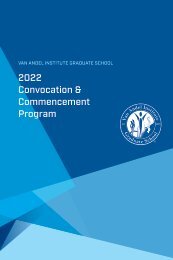2023 Fall/Winter Highlights of Hope
This is the 2023 Fall/Winter edition of Van Andel Institute's Highlights of Hope donor publication.
This is the 2023 Fall/Winter edition of Van Andel Institute's Highlights of Hope donor publication.
Create successful ePaper yourself
Turn your PDF publications into a flip-book with our unique Google optimized e-Paper software.
RESEARCH<br />
Breakdown <strong>of</strong> protective<br />
mechanisms can drive lung<br />
cancer development<br />
Losing a pair <strong>of</strong> “protector” proteins kickstarts changes that<br />
transform healthy lung cells into cancerous ones, according to<br />
research from Van Andel Institute scientists.<br />
The findings may have implications for cancer treatment and<br />
prevention strategies.<br />
“Our study sheds new light on the importance <strong>of</strong> epigenetics in<br />
cancer development,” said Dr. Gerd Pfeifer, a VAI pr<strong>of</strong>essor and<br />
senior study author. “In theory, it is easier to target epigenetics<br />
than genetics in cancer treatment, which opens fresh possibilities<br />
for new therapies.”<br />
Cancers largely arise from errors in DNA, which scramble the<br />
genetic instructions required for normal function. This allows<br />
malignant cells to flourish and spread, crowding out healthy cells<br />
and causing illness.<br />
Since the 1980s, however, scientists have recognized the role<br />
<strong>of</strong> another critical regulatory system in cancer development:<br />
epigenetics.<br />
Epigenetic mechanisms govern whether genes are “on” or “<strong>of</strong>f” by<br />
adding or removing special chemical tags. When these tags aren’t<br />
used at the right time, they can wreak havoc and drive disease<br />
development.<br />
Although epigenetic mechanisms are now recognized as central<br />
players in cancer, exactly how these processes work remains<br />
unclear.<br />
To find answers, Pfeifer and his team focused a pair <strong>of</strong> proteins<br />
tasked with protecting genes from inappropriate tagging.<br />
Using models <strong>of</strong> lung cancer, they found that the loss <strong>of</strong> each<br />
protein on its own had minimal impact but losing them in tandem<br />
unleashed chaos and resulted in cancer. The findings are among<br />
the first to demonstrate a wholly epigenetic origin for cancer cells.<br />
Going forward, Pfeifer plans to explore this process in other cancer<br />
types. If the phenomenon occurs beyond lung cancers, it could<br />
have broad implications for the development <strong>of</strong> new therapies.<br />
“This discovery was a welcome surprise,” Pfeifer said. “I hope it leads<br />
to new opportunities to more effectively prevent and treat these<br />
devastating diseases.”<br />
Funding Acknowledgement<br />
Research reported in this publication was supported by Van Andel Institute and the National Cancer Institute <strong>of</strong><br />
the National Institutes <strong>of</strong> Health under award no. R01CA234595 (Pfeifer). The content is solely the responsibility<br />
<strong>of</strong> the authors and does not necessarily represent the <strong>of</strong>ficial views <strong>of</strong> the National Institutes <strong>of</strong> Health.<br />
“This discovery was a welcome<br />
surprise. I hope it leads to new<br />
opportunities to more effectively<br />
prevent and treat these<br />
devastating diseases.”<br />
— Dr. Gerd Pfeifer<br />
2 | VAN ANDEL INSTITUTE HIGHLIGHTS OF HOPE


